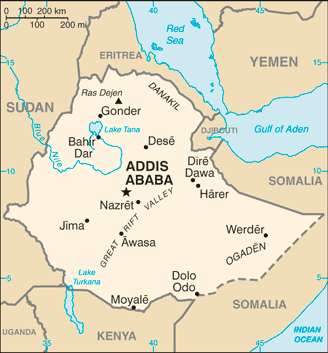The Ethiopian government has launched a preventive measles vaccination campaign that has an immunization target of 928,000 children aged between 6 months and 15 years.

Image/CIA
In a statement, the Ministry of Health said the program would target internally displaced and host communities in the Gedeo Zone of the Southern Nations, Nationalities and Peoples Region.
The campaign will also include the administration of vitamin A to children aged between 6 months and 5 years, as well as de-worming of children aged two to five years. More than 516 000 more children will be targeted in a similar campaign set to start shortly in the West Guji Zone of Oromia Region.
Close to one million internally displaced persons (IDPs) live in schools, unfinished buildings, and tents in the Gedeo and West Guji zones. The make-shift camps are over-crowded and have very limited access to safe water, hygiene and sanitation.
According to the World Health Organization (WHO), conditions in the camp pose increased risks for the spread of communicable diseases. WHO Representative in Ethiopia Dr Akpaka Kalu said the United Nations Children’s Fund (UNICEF) will deliver 750,000 doses of measles vaccines, while the Ethiopian Ministry of Health will deliver the balance of 900,000 doses.
“Conducting vaccination campaigns for the displaced and host communities is key to preventing an outbreak of infectious diseases such as measles. Malnutrition also needs to be addressed, which is why this campaign is integrated with vitamin A distribution and deworming for young children.
“WHO teams are on the ground in Gedeo working with government staff for technical, operational and logistical support to the campaign and to the overall health emergency response,” Dr Kalu said.
According to UNICEF, women and children are facing a rapidly deteriorating nutrition situation in the IDP camps. The organization has provided malnutrition treatment supplies, and deployed trucks to deliver safe water in the West Guji local government area.
It has also distributed soap, jerry cans, water tanks, and other non-food items as part of the response. Technical experts are on the ground to support the immunization campaign.
- Lyme disease in the US: The Quest Diagnostics Health Trends report
- Mexico prepares for increase in influenza
- MERS: The latest data from the WHO global update
- Red tide in Southwest Florida
- Dengue: More local cases reported in Greater Taipei
- Measles in Ukraine: 755 additional cases reported in past week

